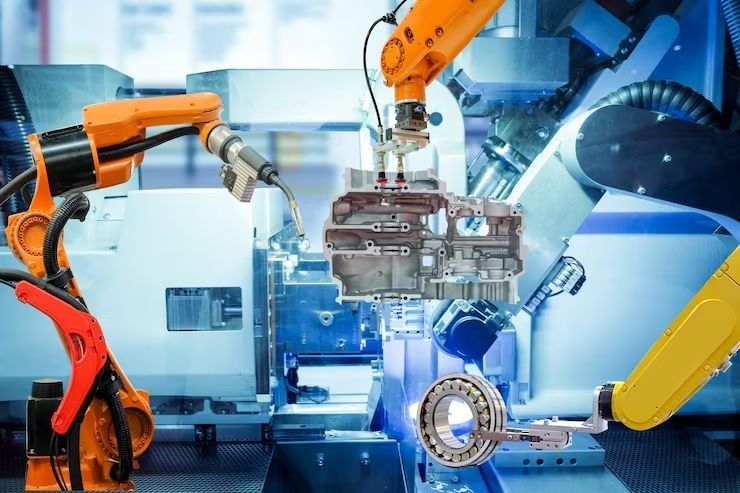Industrial machinery refers to a wide range of equipment and systems designed to support manufacturing, construction, energy, and other industrial activities. These machines include everything from conveyors, pumps, and compressors to large-scale robotic systems used in automation.
Importance
Industrial machinery holds great significance in modern society.

-
Productivity and efficiency: Advanced machines enable faster and more consistent production.
-
Safety: Machinery reduces the risks associated with manual labor and increases workplace protection.
-
Economic development: The growth of industrial machinery supports multiple sectors such as automotive, aerospace, energy, and food production.
-
Innovation: The integration of artificial intelligence, machine learning, and automation helps industries innovate at a faster pace.
-
Global competitiveness: Countries that invest in advanced machinery often remain more competitive in global markets.
Industrial machinery affects manufacturers, engineers, researchers, and governments by addressing challenges in sustainability, production quality, and operational efficiency.
Recent Updates
In the past year, several updates have shaped the industrial machinery sector:
-
Automation and robotics expansion: In 2023–2024, factories worldwide adopted robotic arms, smart conveyors, and automated quality checks to optimize efficiency.
-
Sustainable energy machinery: Equipment designed for renewable energy sectors such as wind and solar has grown in demand.
-
Digital twins and IoT: Companies increasingly use digital twin technology to simulate machine performance and prevent downtime.
-
AI-driven predictive maintenance: Intelligent monitoring systems are now common for reducing machine failures.
-
Global supply chain adjustments: With ongoing logistical challenges, industries are focusing on locally manufactured machinery to improve reliability.
These updates highlight how machinery adapts to sustainability, digitalization, and efficiency trends.
Laws or Policies
Industrial machinery is regulated by safety standards, environmental rules, and international guidelines.
-
Occupational safety regulations: Governments enforce workplace safety standards to reduce accidents caused by machinery.
-
Environmental policies: Many regions require machines to meet emission and energy efficiency standards.
-
Trade and import/export rules: Regulations affect the movement of industrial machinery across borders, especially for high-tech equipment.
-
ISO standards: The International Organization for Standardization provides global benchmarks for quality and safety in machinery manufacturing.
-
Government incentives: Some countries provide programs to promote sustainable machinery adoption, encouraging green manufacturing practices.
Compliance with these laws ensures safer operations, reduced environmental impact, and alignment with global standards.
Tools and Resources
Traveling through the complexity of industrial machinery becomes easier with specialized resources.
-
CAD and simulation software: Tools like AutoCAD and SolidWorks help design and analyze machinery.
-
Predictive maintenance platforms: Software such as IBM Maximo and Siemens MindSphere monitor equipment health.
-
Online databases: Websites like OSHA and ISO provide access to safety and regulatory information.
-
Energy calculators: Tools that help estimate machinery power usage and efficiency.
-
Industry reports and research portals: Sites such as Statista and ResearchGate provide valuable market and technical insights.
Example Table: Industrial Machinery Applications by Sector
| Sector | Common Machinery Used | Key Impact |
|---|---|---|
| Manufacturing | CNC machines, robotics, conveyors | Increases production speed and precision |
| Construction | Excavators, cranes, loaders | Enables large-scale infrastructure projects |
| Energy | Turbines, compressors, solar equipment | Supports renewable and traditional power |
| Food Processing | Packaging machines, mixers, fillers | Ensures food safety and efficiency |
| Mining | Drills, crushers, transport systems | Improves resource extraction and safety |
This table demonstrates how machinery supports different industries, shaping efficiency and innovation.
FAQs
What is industrial machinery?
It refers to equipment and systems used in industries for production, construction, energy, and related applications.
Why is industrial machinery important for businesses?
It improves productivity, ensures consistent quality, and enhances workplace safety, helping industries remain competitive.
What are the latest trends in industrial machinery?
Automation, artificial intelligence, sustainable energy equipment, and digital twin technology are major trends in 2023–2024.
How do governments regulate industrial machinery?
Through safety standards, environmental rules, ISO certifications, and industry-specific compliance measures.
Which tools are useful for managing industrial machinery?
Simulation software, predictive maintenance platforms, energy calculators, and official regulatory resources.
Conclusion
Industrial machinery remains the backbone of global industries, enabling production, infrastructure development, and energy supply. With constant technological advancements, including robotics, AI, and sustainability-focused designs, machinery continues to redefine efficiency and innovation.
Regulatory compliance, safety, and environmental considerations ensure machinery contributes positively to economies and societies. By leveraging modern tools and resources, industries can navigate challenges while preparing for a more sustainable, automated, and productive future.